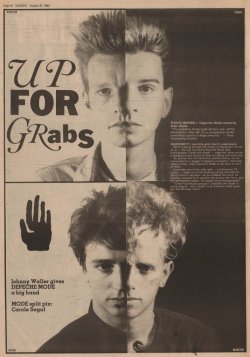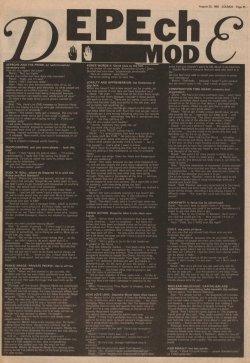Up For Grabs
[Sounds, 20th August 1983. Words: Johnny Waller. Picture: Carole Segal.]


UP FOR GRABS
FIERCE WORDS I: Depeche Mode stand by their ideals.
“The grabbing hands / grab all they can / all for themselves / after all / it’s a competitive world / everything counts in large amounts.” – from “Everything Counts”.
ANONYMITY I: the little girls (don’t) understand.
We’re walking through the streets of Bayswater, the six of us – the four fun-loving Depeche Mode lads, photographer Carole and myself – when we come across a playground that would be ideal for taking some pictures.
No sooner than the band have started posing, we are surrounded by a gaggle of giggling youngsters, nervously edging closer, coyly hoping to speak to the stars in front of them.
Eventually one of the older girls – a precocious 13 maybe – steps out of the blushing throng and asks for David Gahan’s signature. As he scribbles his name he playfully enquires as to whether she knows who he is, and she immediately replies “of course, you’re Kajagoogoo!” [1]
“Christ Kaja-bloody-googoo!” explodes the singer in mock disgust, “why couldn’t it be someone really good like The Birthday Party?”
DEPECHE AND THE PRESS: an (unfortunately) necessary evil:
How do you regard the press?
Martin: “Not too highly.”
Would you rather not have done this interview?
Fletch: “Yeah, ‘cos I’m lazy!”
Martin: “ANY interview really!”
Alan: “Also it’s only the journalist’s view of us, so whatever we say always gets distorted, so what people are reading about us is often incorrect. In a way, being misinterpreted is worse than being misquoted because misinterpretation can destroy your whole point of view!”
So what’s the main thing you’ve always wanted to convey?
Alan: “No, there’s no ONE message to Depeche Mode and I’m not saying it’s only us who get misinterpreted, I’m sure it happens to all bands.”
Martin: “We haven’t really got a message. We only talk to the press when we’ve got a new single or album coming out or when we’re going on tour – That’s our message really!”
Last week, Depeche Mode’s forceful new single “Everything Counts” jumped to number ten in the charts. This week their third LP, “Construction Time Again” – a startling, mature culmination of innovation and melodicism – is released. Next month, they launch themselves on an extensive tour.
This is indeed a message worth heeding.
[Sounds, 20th August 1983. Words: Johnny Waller. Picture: Carole Segal.]
Imaginatively-arranged interview, focussing if anything on the band's mistrust of the press and the pop music merry-go-round, with the conversation sliced into brief soundbites for each subject. The writer seems genuinely interested in each band member's point of view, striving to understand their points and present them fairly. While the writer is upbeat about Construction Time Again, this doesn't drown out other aspects. A recommended piece.
“ Whatever we say always gets distorted, so what people are reading about us is often incorrect. In a way, being misinterpreted is worse than being misquoted because misinterpretation can destroy your whole point of view! ”
Summary: Imaginatively-arranged interview, focussing if anything on the band's mistrust of the press and the pop music merry-go-round, with the conversation sliced into brief soundbites for each subject. The writer seems genuinely interested in each band member's point of view, striving to understand their points and present them fairly. While the writer is upbeat about Construction Time Again, this doesn't drown out other aspects. A recommended piece. [2648 words]


UP FOR GRABS
FIERCE WORDS I: Depeche Mode stand by their ideals.
“The grabbing hands / grab all they can / all for themselves / after all / it’s a competitive world / everything counts in large amounts.” – from “Everything Counts”.
ANONYMITY I: the little girls (don’t) understand.
We’re walking through the streets of Bayswater, the six of us – the four fun-loving Depeche Mode lads, photographer Carole and myself – when we come across a playground that would be ideal for taking some pictures.
No sooner than the band have started posing, we are surrounded by a gaggle of giggling youngsters, nervously edging closer, coyly hoping to speak to the stars in front of them.
Eventually one of the older girls – a precocious 13 maybe – steps out of the blushing throng and asks for David Gahan’s signature. As he scribbles his name he playfully enquires as to whether she knows who he is, and she immediately replies “of course, you’re Kajagoogoo!” [1]
“Christ Kaja-bloody-googoo!” explodes the singer in mock disgust, “why couldn’t it be someone really good like The Birthday Party?”
DEPECHE AND THE PRESS: an (unfortunately) necessary evil:
How do you regard the press?
Martin: “Not too highly.”
Would you rather not have done this interview?
Fletch: “Yeah, ‘cos I’m lazy!”
Martin: “ANY interview really!”
Alan: “Also it’s only the journalist’s view of us, so whatever we say always gets distorted, so what people are reading about us is often incorrect. In a way, being misinterpreted is worse than being misquoted because misinterpretation can destroy your whole point of view!”
So what’s the main thing you’ve always wanted to convey?
Alan: “No, there’s no ONE message to Depeche Mode and I’m not saying it’s only us who get misinterpreted, I’m sure it happens to all bands.”
Martin: “We haven’t really got a message. We only talk to the press when we’ve got a new single or album coming out or when we’re going on tour – That’s our message really!”
Last week, Depeche Mode’s forceful new single “Everything Counts” jumped to number ten in the charts. This week their third LP, “Construction Time Again” – a startling, mature culmination of innovation and melodicism – is released. Next month, they launch themselves on an extensive tour.
This is indeed a message worth heeding.
